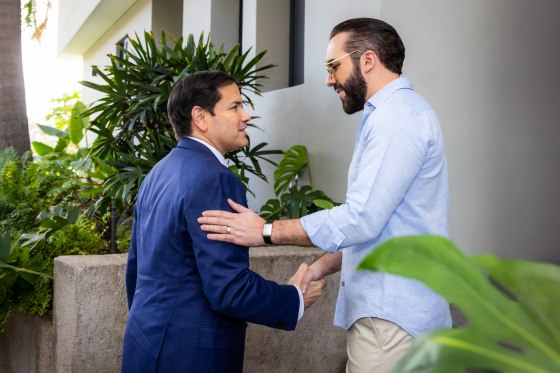
Following his announcement on Tuesday that Salvadoran President Nayib Bukele had offered to take in violent U.S. citizens incarcerated in American jails and deportees of any nationality, U.S. Secretary of State Marco Rubio faced criticism.
“President Bukele made that proposition. Speaking to reporters in Costa Rica on Tuesday afternoon, the third stop of his first international trip as secretary of state, Rubio stated, “Obviously, we’ll have to study it on our end.” “Clearly, there are legal issues at play. It’s a very generous offer, but we also have a Constitution and other things.
According to Rubio, the Trump administration has not yet decided whether to accept the offer.
In an interview with NBC News, three legal and immigration experts questioned the legitimacy of such measures and predicted strong legal opposition to any attempt to transfer American citizens who are now detained to another nation.
“One of the citizens of the United States cannot be deported. Only noncitizens are subject to deportation,” stated Jennifer Gordon, a professor of law at Fordham Law School.
However, the story doesn’t finish there. The possibility of the United States sending a U.S. citizen prisoner abroad to complete their sentence is the subject of a second series of inquiries, she stated.
According to John Fishwick, a former U.S. attorney in Virginia, current rules would absolutely prohibit the majority of U.S. nationals and residents from serving their term in El Salvador.
According to him, a criminal in the United States can only be deported to their home country with their cooperation and for specific offenses that are applicable in both nations.
Fishwick went on to say that keeping citizens and inmates in a prison in another country would violate the constitution, particularly in regards to cruel and unusual punishment. Would El Salvador be seen as an American agent? Which court would be able to hear conflicts involving prisoners?
As part of his continued tour of Latin America, Rubio met with Bukele on Monday in El Salvador. Rubio is pressing regional leaders to take greater action in support of Trump’s policy agenda, which includes his immigration crackdown.
The offer made by Bukele “to house in his jails dangerous American criminals in custody in our country, including those of U.S. citizenship and legal residents,” according to Rubio, was the most contentious of the several agreements they negotiated.
‘An extraordinary gesture’
According to Rubio’s article on X, Bukele’s offer was “an extraordinary gesture never before extended by any country.”
“Very productive meeting with Salvadoran President@nayibbukele,” the message reads. “His commitment to accept and incarcerate criminals from any country, including from violent gangs like MS-13 and Tren de Aragua, will make America safer.”
Gordon from Fordham stated, Can criminally convicted Salvadorans be deported to El Salvador by the United States? Indeed. Can El Salvador continue to house those inmates in its own jails? Indeed. However, it is not an immigration issue with regard to U.S. citizens. It’s a question of prison policy.
The Federal Bureau of Prisons and the Department of Justice were contacted by NBC News for comment, but they did not respond right away.
Bukele explained in a another post on X that El Salvador is “willing to take in only convicted criminals (including convicted U.S. citizens) into our mega-prison (CECOT) in exchange for a fee.”
“We have offered the United States of America the opportunity to outsource part of its prison system,” the message adds. “The fee would be relatively low for the U.S. but significant for us, making our entire prison system sustainable.”
Built to house 40,000 inmates, the Terrorism Confinement Center, or CECOT as Bukele called it, is a Salvadoran prison. Human rights groups including Human Rights Watch and Amnesty International have reported instances of severe overcrowding and guard mistreatment at this institution.
An NBC News request for comment and more information on the offer was not answered by Bukele’s office.
Rubio claimed to have briefed Trump on this offer and a few others after meeting with Bukele on Monday.
Bukele also consented to continue receiving Salvadoran nationals deported from the United States, which El Salvador currently does, according to Rubio’s office.
Additionally, Bukele promised to take in foreign citizens from other nations who have been detained in the United States for breaking immigration laws.
Due to the COVID-19 epidemic, El Salvador never executed the safe third country contract that it had previously agreed in 2019 to receive non-Salvadorans jailed in the United States.
The Migration Policy Institute policy analyst Kathleen Bush-Joseph stated that noncitizens and those who have been granted protections that prohibit the United States from sending them to a country where they might be subjected to torture or persecution “could be sent to a third country as long as that’s not the country where they would face persecution or torture.”
However, Bush-Joseph noted that it might be more difficult for noncitizens to contest their deportations, even if they are sent to a foreign country, as the Trump administration enacts policies that permit officials to circumvent standard immigration law and expedite the deportations of anyone with a removal order.
If attempts are made to deport U.S. citizens, Gordon said she would expect constitutional and due process objections.
